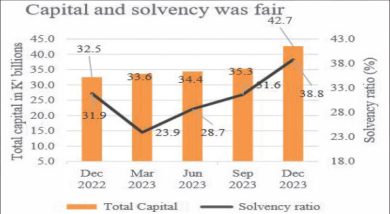Cotton trade transforms farmers’ lives

Aumel Jamu was once a vibrant trader plying his business inside Balaka Market. However, a misfortune befell him when, in the early hours of one Thursday morning in November 2012, the market was gutted by fire.
Jamu, who comes from Kandengwe Village, T/A Nsamala in Balaka, was one of the many traders who had their goods completely destroyed by the fierce inferno. His life depended on the business, and with the fire that destroyed his merchandise, his future plans, it seems, were shuttered.
But an opportunity arose. Jamu who is in early 40s decided to venture into cotton growing, despite not being sure of the benefits. He was one of thousands of farmers who registered with Malawi Cotton Company Limited (MCCL), a Chinese-owned Balaka-based cotton ginner, and were given certified chureza cotton seed and pesticides.
MCCL which has, thus far, invested $20 million (K7 billion, at the current exchange rate), a subsidiary of China Africa Cotton Development Limited and makes full use of hi-tech equipment and carries out a number of different businesses including cotton seed breeding, distribution, planting, processing, marketing, oil processing and sale of cotton by-products.
Jamu told Business Review last Friday that since he started growing the crop his life and that of his family has completely changed.
“I have managed to secure another space in the [Balaka] market and my business has also picked up considerably. The company is buying the cotton at very competitive prices ranging from K220 to K230 per kilogramme [kg],” he said.
Government set the minimum farm-gate price for cotton, one of the country’s strategic crops, at K150 per kg.
Since Jamu started growing the crop, in fact this is his second year, he has never looked back.
“When we used to sell our cotton to other companies, we were not benefiting because the prices were not good. They used to buy our crop at as low at K50 per kg. Besides that, they were not giving us the pesticides and certified seeds which were affecting our yield’s output.
“The Malawi Cotton Company distributes certified seeds and pesticides in our respective clubs in good time and this has enabled us to have a quality crop,” he explained.
At the time of the interview, Jamu who grew the crop on a three-hectare piece of land, had just sold part of his crop and was paid K45 000 which, he said, will help him pay school fees for children and buy farm inputs in anticipation for the forthcoming growing season.
Another cotton farmer, Blandina Kandima, is also singing praises for the cotton firm.
“We no longer are complaining of being ripped off by middlemen. The company is offering us good prices as compared to the other buyers. The good prices they are offering are encouraging us to think of growing more of the crop next year,” said Kandimba, who has been growing cotton for three years now.
“I wanted to stop growing cotton, but because of the prices Chinese firm is offering, I have been encouraged to grow more this year,” he said.
Balaka is one of the districts in Malawi that faces perennial hunger because of dry spells. But Macfelson Bwanali, another cotton farmer, said this year they can afford to buy maize using cotton sales proceeds.
“The company has indeed improved the welfare of people in the district. Our households are now food secure,” he said, urging the company to continue improving the welfare of farmers in the district.
The company gives out a t-shirt and a cap to a farmer who has sold the crop to them.
According to the company’s agriculture manager, Trueman Kachale, their core business is cotton ginning at Balaka and the recently acquired plant in Salima, previously owned by Cargill, an international producer and marketer of food. This makes MCCL one of the biggest cotton companies in Malawi.
“Malawi farmers are encouraged and supported to grow the crop. We operate over 350 rural markets/depots in predominantly cotton growing areas through which we make available to farmers farm inputs and provide extension services. We also use the same outlets to procure seed cotton, after harvest,” Kachale, flanked by the company’s general manager Yan Peize and assistant general manager Wei Bing, told journalists who were conducted on the first ever tour of the premises since its inception on November 4 2008.
The company, he said, has introduced improved farming technologies in cotton production through the Salima Chinese Agricultural Training Centre.
Meanwhile, the average yield per hectare is 650 kg and this is bound to increase to 3.5 metric tonnes per hectare thanks to improved technology.
“Currently, the company makes available to farmers Chureza cotton seeds, a released variety by government, at the most convenient time when supply of certified seeds has been a challenge. It is expected that once the agriculture centre in Salima is ready, it will help in ensuring that certified cotton seeds are readily available to the farmers in Malawi,” explained an upbeat Kachale.
Not only that, the company also supplies cotton pesticides timely to farmers sourced through its worldwide business links.
Cotton is grown by more than 200 000 farming families in the cotton growing areas of Shire Valley, Balaka, Machinga, Phalombe, Blantyre, Mwanza, Neno and Karonga.
Currently, Malawi exports 95 percent of the cotton and remaining five percent is processed locally.




